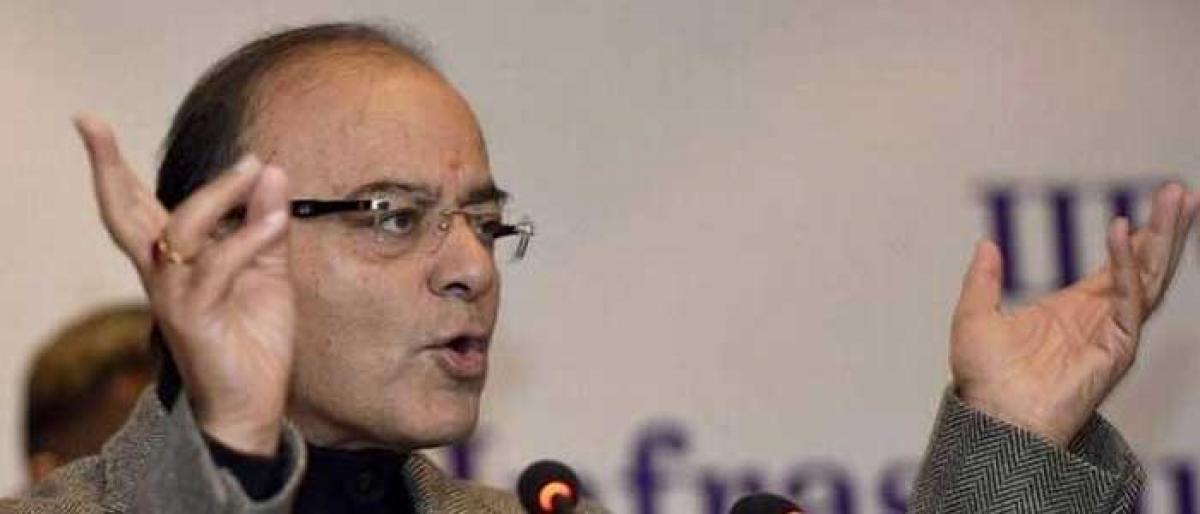Live
- SP T. Srinivas Rao Inaugurates State-of-the-Art Volleyball Court for Police Personnel in Jogulamba Gadwal
- Geeta Jayanti Celebrations Organized at Maldakal Thimmappa Swamy Temple
- Indiramma Housing Scheme Survey Reviewed by District Collector
- Government Committed to Resolving ASHA Workers' Issues: Minister Damodar Raja Narasimha
- 'Refrain from interfering in municipal polls': Union Minister Ravneet Bittu tells Punjab officials
- SC grants anticipatory bail to accused in POCSO case
- Rising Rajasthan Summit to return in 2026, says CM Sharma
- Kerala HC issues contempt notice to official over elephant regulation violations
- 3rd ODI: Have to learn to take things till the end, says Harmanpreet after India's 3-0 defeat to Australia
- Brook is probably the best Test batter in the world right now, says Ponting
Just In

Shedding the impact of GST and demonetisation, India\'s economy is \"picking up quite nicely,\" and will expand by 7-7.5 per cent in 2018-19 to again become the world\'s fastest growing major economy, according to the Economic Survey released on Monday.
New Delhi: Shedding the impact of GST and demonetisation, India's economy is "picking up quite nicely," and will expand by 7-7.5 per cent in 2018-19 to again become the world's fastest growing major economy, according to the Economic Survey released on Monday.
However, it could face challenges from rising oil prices and a sharp correction in the elevated stock prices, according to the Survey, an annual account of the state of economy prepared by the Chief Economic Adviser, independent of the government.
Released just two-days before the BJP government presents its fifth and final full-year Budget, the Survey did not rule out a pause in fiscal consolidation plan of the general elections due next year. The Economic Survey 2017-18 was presented in Parliament by Finance Minister Arun Jaitley.
The economy "seems to be picking up quite nicely and robustly" as temporary impact of demonetisation and GST has been decimated, CEA Arvind Subramanian later told reporters. The Survey has pegged the GDP growth for the current fiscal at 6.75 per cent and said that exports as well as private investments are set to rebound in the coming year.
The growth rate is higher than the recent CSO estimate of 6.5 per cent. The Gross Domestic Product (GDP) growth was 7.1 per cent in 2016-17 and 8 per cent in the preceding year. It was 7.5 per cent in 2014-15.
The growth in the current fiscal has been marred by the rollout of a nationwide Goods and Services Tax (GST) and the after effects of demonetisation of high value currency notes in November 2016. The good news for the economy comes just before the country heads toward several assembly elections this year and general elections scheduled before May 2019.
More importantly, it points to the chaotic GST implementation finally stabilising and the waning of the after-effects of demonetisation. Subramanian said the growth would be higher than 7.5 per cent if exports pick up, but he listed oil prices and a correction in elevated share prices as downside risks. The average price of the basket of crude India imports rose by around 14 per cent in the current fiscal and is projected to further rise by 10-15 per cent in 2018-19, the Survey said.
GDP may be impacted by 0.2-0.3 per cent, inflation will be higher by 0.2-0.3 per cent and current account deficit will widen if oil prices were to rise by $10 per barrel, Subramanian said.
"Against emerging macroeconomic concerns, policy vigilance will be necessary in the coming year, especially if high international oil prices persist or elevated stock prices correct sharply, provoking a 'sudden stall' in capital flows," the Survey has warned.
However, it said that with world growth likely to witness moderate improvement in 2018, expectation of greater stability in GST, likely recovery in investment levels, and ongoing structural reforms should support higher growth. "On balance, country's economic performance should witness an improvement in 2018-19."
For the next year, it prescribed: "Stabilising the GST, completing the twin balance sheet actions, privatising Air India, and staving off threats to macro-economic stability.
"Over the medium term, three areas of policy focus stand out: Employment - finding good jobs for the young and burgeoning workforce, especially for women; Education - creating an educated and healthy labour force; Agriculture - raising farm productivity while strengthening agricultural resilience."
India, it said, must continue improving the climate for rapid economic growth on the strength of the only two truly sustainable engines - private investment and exports. It warned that economic management will be challenging in the coming year due to overall economic and political background.
"Setting overly ambitious targets for consolidation - especially in a pre-election year - based on optimistic forecasts that carry a high risk of not being realised will not garner credibility," said the Survey.

© 2024 Hyderabad Media House Limited/The Hans India. All rights reserved. Powered by hocalwire.com







